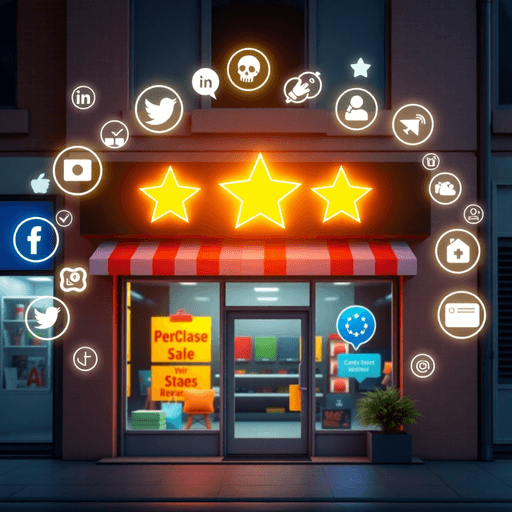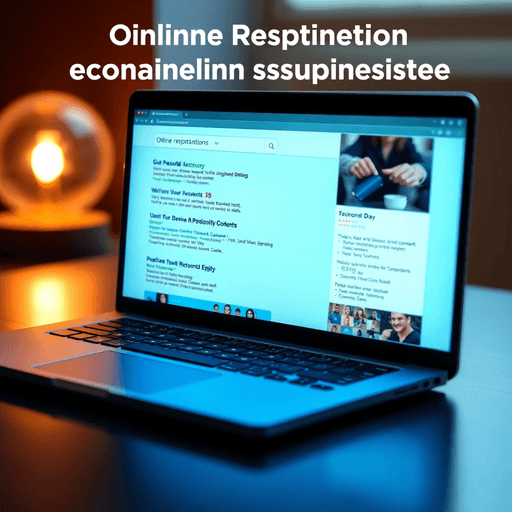A viral reputation crisis occurs when negative information about an individual or organization spreads rapidly across digital platforms, causing significant damage to their online reputation. In the digital age, this can happen almost instantaneously due to the pervasive nature of social media and online news outlets.
Managing your online reputation proactively is crucial. The stakes are high as a damaged reputation can lead to loss of trust, revenue, and opportunities. Rapid digital communication amplifies reputational risks, making it essential for businesses and individuals alike to have robust crisis management strategies in place.
Understanding how quickly a small incident can escalate into a full-blown crisis is key to protecting your online identity. This is where proactive reputation monitoring comes into play, safeguarding your online reputation by alerting you to risks early.
Whether you’re an individual looking for personal online reputation management strategies or a business aiming to master effective reputation management, it’s essential to have a plan in place. Such strategies not only help in building and protecting your brand but also play a crucial role in restoring it during a crisis.
For more insights on how to protect your digital image and manage online reviews effectively, our blog offers a wealth of resources.
Understanding Viral Reputation Crises
Viral reputation crises can come from different sources, often catching businesses and individuals by surprise. Here are some common causes:
- Negative comments: Unhappy customers or former employees can post harmful remarks that quickly gain attention.
- Misinterpreted news: Miscommunication or misleading headlines can lead to widespread misinformation.
- Data breaches: Unauthorized access to sensitive information can severely damage trust.
- Fake reviews: Competitors or malicious entities may post fraudulent reviews to harm a reputation.
The Speed of Social Media
Negative incidents spread rapidly on social media and digital platforms because these channels are interconnected. A single tweet or post can be shared, retweeted, or commented on by thousands within minutes, creating a snowball effect that magnifies the issue. This means that social media backlash can escalate quickly, making it difficult to control the narrative.
The Importance of Online Reputation Management
In such situations, knowing how to remove negative content from Google or using expert content removal services to eliminate negative posts can be extremely valuable. Additionally, having a solid plan for managing online reviews and dealing with negative feedback through DIY online reputation management tips is crucial.
Learning from Real-World Examples
Real-world examples show us the different types of viral crises:
- United Airlines: In 2017, United Airlines faced severe backlash when a video of a passenger being forcibly removed from an overbooked flight went viral. The incident led to widespread criticism and significantly damaged the airline’s reputation.
- H&M: The fashion retailer experienced a crisis in 2018 after an advertisement featured a black child wearing a hoodie with the phrase “coolest monkey in the jungle.” Accusations of racism spread rapidly, leading to protests and calls for boycotts.
These examples highlight how important it is to handle viral content proactively and manage brand crises effectively. To navigate such challenging times successfully, mastering reputation crisis management is essential.
The Role of Crisis Management in Reputation Protection
Identifying a crisis in its earliest stages sets the foundation for effective reputation restoration. Rapid assessment of the situation allows you to gauge the scope—understanding whether the issue is localized or has potential for global escalation. Early detection often relies on automated alerts, real-time monitoring, and direct feedback channels, providing the intelligence necessary for swift action.
Forming a dedicated crisis management team is essential. This team brings together specialists from communications, legal, IT, and customer service to address all dimensions of the crisis. A well-prepared team coordinates responsibilities, crafts unified messaging, and controls information flow across platforms. The presence of a specialized group ensures that decisions are made quickly and with expert insight, minimizing confusion and operational delays.
Mastering these crisis management techniques not only protects your brand but also ensures that your reputation remains intact during tough times.
Key elements of effective crisis communication include:
- Transparency: Honest disclosure about what happened and what steps are being taken reassures stakeholders that the situation is under control.
- Clarity: Messages must be simple and devoid of jargon—especially during high-pressure situations where confusion can fuel misinformation.
- Authenticity: Genuine concern for those affected goes beyond corporate platitudes. Audiences respond to real voices that acknowledge mistakes and outline concrete actions toward resolution.
“We immediately began investigating the issue and will provide updates as we learn more,” signals transparency and accountability—a stark contrast to evasive or generic statements.
Crisis management strategies grounded in these principles not only contain damage but also lay groundwork for long-term reputation restoration. Transparent communication builds trust even amid uncertainty, positioning brands to recover credibility once the immediate crisis subsides.
Such strategies are part of a broader framework known as corporate reputation management. By mastering this field, brands can unlock top talent and customer loyalty with strong reputation strategies. Learning from case studies like Chipotle, Uber, and Pepsi can further maximize your brand’s value.
Additionally, understanding the essence of a value proposition is crucial for stellar reputation management. It sets your brand apart and attracts loyal customers effortlessly.
Tools and Techniques for Viral Content Handling
The ability to detect and respond to a viral reputation crisis in real time depends on leveraging the right digital tools. Social listening tools like Hootsuite and Brandwatch serve as an early warning system by monitoring conversations, hashtags, and brand mentions across social platforms. These platforms enable you to:
- Track spikes in negative sentiment or trending keywords associated with your brand.
- Identify influential users spreading harmful content.
- Analyze patterns in how rumors or complaints escalate.
To combat the spread of harmful online content, you might want to consider removing harmful online posts. This can safeguard your reputation by employing expert strategies for content removal.
Google Alerts provides another line of defense. Set up alerts for your brand name, executives, and key products to receive instant notifications about new mentions anywhere on the web. This allows immediate awareness when potentially damaging information surfaces outside traditional social channels.
Review monitoring services such as Trustpilot keep a constant eye on customer feedback across major review sites. You can flag suspicious or fake reviews quickly, respond publicly when necessary, and collect insights on recurring issues that may need urgent resolution.
For organizations needing tighter coordination during a viral reputation crisis, crisis management software offers centralized dashboards and workflow automation. These solutions bring together social listening, review monitoring, internal communication channels, and task assignments so your team can:
- Coordinate messaging for consistent public responses.
- Assign specific tasks such as drafting replies or reaching out to media contacts.
- Track response times to ensure no incident goes unaddressed
A multi-layered approach—combining social listening tools, review monitoring services, Google Alerts, and dedicated crisis management platforms—empowers you to maintain situational awareness and orchestrate a real-time response before reputational damage spirals out of control.
Additionally, implementing SEO reputation management services can help improve your online reputation with advanced SEO strategies that promote positive content effectively.
SEO Strategies to Mitigate Reputation Damage During a Crisis
Impact of SEO on Brand Perception and Search Engine Visibility During a Crisis
When a reputation crisis hits, SEO for reputation management becomes crucial. Your brand’s search engine visibility can be significantly impacted by negative content. This content often ranks higher due to increased traffic and engagement, pushing positive information down the search results. This shift in visibility can lead to lasting damage to your brand perception.
Strategic Keyword Targeting to Enhance Positive Brand Relevance in Search Results
To counteract this, strategic keyword targeting is essential. By identifying and using relevant keywords that highlight your brand’s positive aspects, you can improve your search engine rankings for favorable content.
Practical Steps
- Identify Positive Keywords: Focus on keywords that reflect your brand’s values, strengths, and unique selling points.
- Create High-Quality Content: Develop content around these keywords. Blog posts, press releases, and social media updates should emphasize positive news about your brand.
- Optimize Existing Content: Ensure all existing online content is optimized with these targeted keywords. This includes meta descriptions, alt tags, and structured URLs.
Practical Steps
- Monitor Search Trends: Use tools like Google Trends to identify shifts in search behavior related to your brand during a crisis.
- Leverage Positive Reviews: Encourage satisfied customers to leave positive reviews on platforms like Google My Business and Trustpilot. These reviews can significantly boost your online credibility, enhancing your overall brand trust.
- Content Distribution: Share newly created content through various channels such as social media, email newsletters, and reputable industry websites.
By focusing on these SEO strategies, you can mitigate the impact of a viral reputation crisis, enhance positive brand relevance in search results, and regain control over your online presence.
Integrating Public Relations with SEO for Enhanced Reputation Management
While SEO plays a vital role in managing online reputation during a crisis, integrating effective public relations strategies can further enhance your efforts. These strategies not only help in damage control but also play a crucial role in creating a positive brand image which is vital for long-term success.
It’s important to remember that managing an online reputation is an ongoing process. Utilizing reputation repair services can provide you with the necessary tools and strategies needed for effective management and repair of your online reputation.
Combining SEO with robust public relations efforts and leveraging professional reputation repair services creates a comprehensive approach towards managing and mitigating reputation damage during crises.
Personal vs. Business Reputation Management Approaches: A Comparative Study
Personal Reputation Management vs Business Brand Image Protection
Managing an individual’s online reputation differs significantly from handling a corporate brand’s image. Each requires a tailored approach to address unique challenges and goals.
Individual Online Reputations
For personal reputation management, the focus is on:
- Addressing Outdated Information: Ensuring that past mistakes or outdated information do not continue to affect one’s current image.
- Unfair Critiques: Countering unfair critiques by highlighting positive achievements and credible testimonials.
- Privacy Concerns: Protecting personal information from being exploited and managing privacy settings across various platforms.
- Reputation Restoration: Using services like Fix My Reputation Online to remove harmful content and restore a positive online presence.
Corporate Brand Reputations
In contrast, managing a business’s reputation centers around:
- Protecting/Enhancing Image: Safeguarding the brand image from negative content and proactively enhancing it through strategic branding efforts. This includes understanding the importance of brand image in marketing and leveraging it to attract top talent and drive customer loyalty.
- Consistency Across Channels: Ensuring that the brand message is consistent across all digital platforms, including social media, websites, and review sites. This might involve removing a Google Business Profile or deleting a business from Google Maps to maintain brand integrity.
- Engaging with Customers: Actively engaging with customers to build trust and loyalty, often through responding to reviews and feedback.
- SEO Integration: Optimizing the website for search engines with strategic keyword targeting, meta descriptions, alt tags, and structured URLs to improve visibility.
Key Differences
- Scope of Impact:
- Personal: Usually affects one individual’s professional and social life.
- Business: Can influence customer perception, sales, and overall market position.
- Nature of Content:
- Personal: Involves personal anecdotes, private issues, and individual achievements.
- Business: Encompasses product quality, customer service experiences, corporate policies.
- Response Strategies:
- Personal: Immediate removal of harmful content; personal branding through positive testimonials (e.g., Jeffery Haze).
- Business: Coordinated crisis management plans; leveraging positive reviews to rebuild trust post-crisis (e.g., Trustpilot reviews). This could also involve utilizing online reputation monitoring tools to protect your brand & manage your image effectively.
Understanding these differences helps in effectively managing both personal and business reputations while ensuring appropriate strategies are employed for each scenario.
The Importance of Timely and Confidential Action in Crisis Management
Quick response importance in crisis management cannot be overstated. When faced with a viral reputation crisis, acting swiftly against negative content is crucial to limit long-term damage. Speedy action can prevent the spread of misinformation and reduce the chance of further reputational harm.
Key reasons for quick action include:
- Containment: Rapid responses help to contain the situation before it escalates, minimizing the reach and impact of negative content.
- Public Perception: Promptly addressing issues shows accountability and responsibility, fostering public trust.
- Prevention of Misinformation Spread: Timely clarifications can stop false information from gaining traction.
Confidentiality is equally important in handling sensitive matters discreetly. Ensuring that any internal discussions or actions taken are kept confidential protects the integrity of your crisis management efforts and maintains stakeholder trust.
Combining a quick response with confidentiality ensures efficient crisis resolution while safeguarding your organization’s reputation.
Leveraging Positive Reviews and Testimonials Post-Crisis: A Case Study Approach
Positive online reviews play a critical role in rebuilding trust and improving search rankings after a crisis. They act as a counterbalance to negative publicity, showcasing customer satisfaction and reinforcing credibility.
Key Benefits of Positive Reviews Post-Crisis:
- Rebuilding Trust: Genuine testimonials from satisfied customers help restore faith in your brand. Highlighting these reviews on your website and social media channels demonstrates transparency and commitment to customer satisfaction. For instance, utilizing 5-star review examples can provide insights on how to showcase stellar reviews effectively.
- Improving Search Rankings: Search engines favor content with high engagement. Positive reviews contribute to this, boosting your visibility in search results. Strategic keyword targeting within these reviews can enhance your brand’s relevance. Moreover, comparing 5-star reviews can help you understand the factors behind high-rated reviews and optimize your online reputation for better conversions.
Case Study Example:
A small business owner, facing damaging online campaigns, leveraged positive testimonials to regain reputation. By actively encouraging satisfied clients to leave detailed reviews, they saw a notable increase in positive feedback. This not only improved their search engine rankings but also helped suppress negative content.
Incorporating platforms like Trustpilot can streamline this process, ensuring that positive experiences are highlighted effectively.
Learning from Past Viral Crises for Future Preparedness: Key Takeaways
High-profile reputation crises provide a blueprint for future preparedness. Companies like United Airlines and H&M have become examples of how delays in response and lack of authentic messaging can intensify negative sentiment. Examining these events reveals several lessons from viral crises for future preparedness:
- Rapid Response is Essential: Delays allow rumors or misinformation to fill the silence. Swift, fact-based communication limits speculation and helps retain some control over the narrative.
- Authenticity Builds Trust: Audiences detect scripted or insincere responses quickly. Honest apologies, clear explanations, and visible corrective action restore credibility faster than defensive posturing.
- Consistent Messaging Across Channels: Inconsistent statements across platforms confuse audiences and escalate distrust. Unified messaging ensures clarity and reduces the risk of misinterpretation.
- Preparedness Plans Matter: Brands with pre-established crisis protocols react faster and more effectively, minimizing chaos when a crisis hits.
These key takeaways emphasize that the core of future-proofing your reputation lies in speed, transparency, and a proactive approach to communication.
Conclusion
A viral reputation crisis can happen to any brand or individual, usually unexpectedly. To maintain a strong online identity, you need to plan strategically, act quickly, and communicate openly at all times. Google’s search results influence how people see you; if you don’t deal with a negative incident promptly and honestly, it could overshadow your online presence.
- Strategic planning prevents chaos when a crisis hits.
- Quick action, such as implementing Fast Reputation Repair, limits the spread of damaging content and ensures a strong online presence for future resilience.
- Transparent communication rebuilds trust with your audience.
Seeking professional support streamlines viral reputation recovery. If protecting your reputation feels overwhelming, Crisis Management Solutions offers discreet and comprehensive services tailored to both individuals and businesses. Leverage expert guidance for faster recovery and long-term digital resilience.
A proactive approach is the strongest defense against reputational threats in the digital age. Remain vigilant, stay prepared, and don’t hesitate to call in expert help when it matters most.






